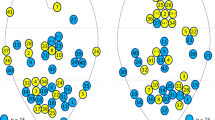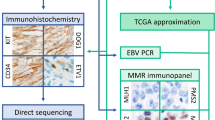Abstract
A total of 1664 patients with gastric cancer were examined to evaluate the rate of multiple synchronous primary tumours. In cases of multiple synchronous cancer (MSC), the tumours were analysed immunohistochemically for their expression pattern of p53, c-erbB2, ras, E-cadherin and proliferative activity. Multiple synchronous gastric carcinomas (MSCs) were observed in 61 out of 1664 patients (3.7%), with a total of 134 carcinomas. In our series, early carcinoma was observed more frequently in MSC than in solitary cancers. The comparison of tumour stage in MSC and solitary tumours revealed that multiple early gastric cancers were significantly more often of type I (protruded type) and IIa (superficial elevated type) than solitary early cancer. Multiple advanced carcinomas were more often of a lower pT category than solitary advanced gastric cancer. Performing immunohistochemistry for p53, c-erbB2 and ras in 134 tumours with MSCs, we observed positivity rates of 33%, 59% and 87% respectively. In 43 patients, the multiple tumours in each individual patient demonstrated an identical status of p53 and c-erbB2, and in 42 patients a similar pattern of E-cadherin expression was observed. The proliferative index, determined by proliferating cell nuclear antigen (PCNA) immunolabelling, did not differ significantly between the MSC in each patient. Ras immunostaining was detected in 53 out of 61 patients, but also in metaplasia and regenerative hyperplasia in the specimens. In survival analysis, no difference was observed between patients with solitary or multiple early or advanced carcinomas. Our results suggest that in at least a high proportion of patients with gastric cancer multiple primary tumours arise from precancerous conditions leading to similar genetic alterations.
This is a preview of subscription content, access via your institution
Access options
Subscribe to this journal
Receive 24 print issues and online access
$259.00 per year
only $10.79 per issue
Buy this article
- Purchase on Springer Link
- Instant access to full article PDF
Prices may be subject to local taxes which are calculated during checkout
Similar content being viewed by others
Author information
Authors and Affiliations
Rights and permissions
About this article
Cite this article
Wittekind, C., Klimpfinger, M., Hermanek, P. et al. Multiple simultaneous gastric carcinomas. Br J Cancer 76, 1604–1609 (1997). https://doi.org/10.1038/bjc.1997.604
Issue Date:
DOI: https://doi.org/10.1038/bjc.1997.604
This article is cited by
-
The correlation between the main and minor lesions of synchronous multiple gastric neoplasms assessed gastroscopically and microscopically
Surgical Endoscopy (2024)
-
Clinicopathological characteristics of synchronous multiple gastric cancers in Chinese: An analysis of 44 cases
Chinese Journal of Cancer Research (2009)
-
Clinicopathologic and Immunohistochemistry Characterization of Synchronous Multiple Primary Gastric Adenocarcinoma
Journal of Gastrointestinal Surgery (2007)



